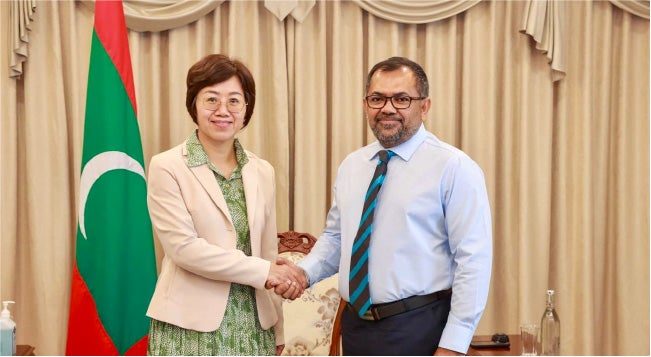Summary
The stalled free trade agreement with China might be operationalised soon by the new government in the Maldives. Its economic consequences could be heavily damaging and the tiny island state could be pushed into an economic crisis.
The Maldives and China signed a bilateral free trade agreement (FTA) on 7 December 2017. However, it was stalled by the Ibrahim Mohamed Solih government, which succeeded the government of President Abdulla Yameen during whose tenure the FTA was signed, calling it a ‘one-sided treaty’. The recent elections in the Maldives have led to a pro-China government taking office under President Mohamed Muizzu. The prospects of the FTA being implemented are quite bright now.
The FTA had run into controversy right from the beginning. This was the first FTA signed by the Maldives. It was indeed surprising that it chose to do so with an economy with which its economic exchanges were entirely one-sided. Former president, Mohamed Nasheed, an advisor to the Solih government, had pointed to the glaring trade imbalance between China and the Maldives and the complete economic irrationality of a bilateral FTA.
The Maldives is a heavily import-dependent economy. Its total imports were US$3.5 billion (S$4.6 billion) in 2022, while its exports in the same year were only US$400 million (S$531 million). Its trade deficit for the year was more than US$3.1 billion (S$4.1 billion). China accounted for 12.6 per cent of the Maldives’ total imports in that year. It was the 3rd largest source of imports for the Maldives in 2022 after Oman and the United Arab Emirates. While the latter countries account for the Maldives’ large imports of energy products, China dominates the imports of non-oil manufacturing items and also accounts for several agricultural and food imports.
The implementation of the FTA by the Maldives will result in a surge in imports from China. Imports of machinery and machinery-related products are specifically expected to increase. This is because demand for these imports will increase as ongoing and new Chinese projects on the island, especially those that are part of China’s Belt and Road Initiative, gather renewed momentum. These projects are in various stages of construction and the FTA will facilitate their import requirements.
Higher imports from China will enhance the Maldives’ trade imbalance with China and increase its overall trade deficit. With the Maldives’ overall export earnings much lower than its expenditure on imports, and with its exports to China unlikely to rise after the FTA, the country might soon find itself struggling with a fast-rising trade deficit. Though the Maldives has a surplus in its commercial services trade, due to robust receipts from tourism, the services surplus is unlikely to offset the rising deficit in goods trade. The implication will be a widening imbalance in the current account of its balance of payments.
The FTA will enable almost half of the Maldives’ current imports from China to enter the country without being charged customs duties immediately upon its coming into effect. Foregoing customs revenue has implications for the public finances of the Maldivian economy. Imports from China are one of the largest sources of customs revenues for the Maldives. If most of these imports now enter the country duty-free, the Maldives will lose foreign exchange earnings. These losses can amount to around three per cent of total government revenues. The losses will increase if duty-free Chinese imports, over time, displace imports from other countries that continue to attract customs duties.
The Maldives’ challenge – in the face of a significant reduction in customs revenue – will be to compensate for the loss through higher revenue collections from elsewhere. The Goods and Services Tax (GST) collections from tourism assume great significance in this regard. Higher GST collections from tourism will require the tourism facilities and services to expand rapidly and tourist flows to remain high. Tourism is vulnerable to exogenous shocks, as experienced during the COVID-19 outbreak. More such unforeseen shocks might affect tourism and revenue prospects adversely. Furthermore, indiscriminate expansion of tourism infrastructure can also adversely impact the Maldives’ fragile ecology.
The combined effect of a deteriorating current account in the balance of payments and progressive reduction in customs revenues can signal the onset of long-term macroeconomic difficulties for the Maldivian economy. This will be due to the simultaneous weakening of revenue-generating capacities for both the external and domestic sectors of the economy. Conditions might worsen with duty-free Chinese imports adversely affecting the prospects of the nascent homegrown textiles industry, resulting in further loss of incomes and jobs.
From an economic perspective, the FTA with China does not appear beneficial for the Maldives. The costs of the FTA can be significant with the Maldivian economy poised to develop major structural weaknesses culminating in an economic crisis. Concerns have already been raised over the rising indebtedness of the Maldivian economy. Escalating external payment liabilities through free imports and squeezing the state’s ability to pay for the imports by surrendering revenues can be a fatal strategy with serious long-term consequences.
. . . . .
Dr Amitendu Palit is a Senior Research Fellow and Research Lead (Trade and Economics) at the Institute of South Asian Studies (ISAS), an autonomous research institute at the National University of Singapore (NUS). He can be contacted at isasap@nus.edu.sg. The author bears full responsibility for the facts cited and opinions expressed in this paper.
Pic Credit: (20) Moosa Zameer (@MoosaZameer) / X (twitter.com)
-
 More From :
More From :
-
 Tags :
Tags :
-
 Download PDF
Download PDF



